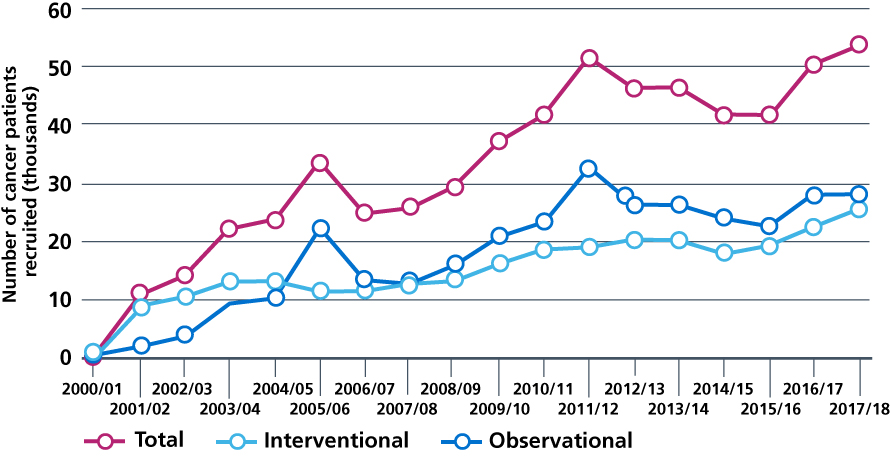Research and innovation to drive future outcomes improvement
3.112. Patients benefit enormously from research and innovation, with breakthroughs enabling prevention of ill-health, earlier diagnosis, more effective treatments, better outcomes and faster recovery. Linking and correlating genomics, clinical data and data from patients provides routes to new treatments, diagnostic patterns and information to help patients make informed decisions about their care. ‘Research-active’ hospitals have lower mortality rates, with benefits not limited to those patients who participate in research.
3.113. Research and innovation are also important for the UK economy, bringing jobs and services. The Government’s Industrial Strategy set an ambition for R&D spending to reach 2.4% of GDP by 2028, which could see health R&D spending hit £14 billion. The Life Sciences Industrial Strategy [158] highlights that the UK is one of the best places in the world to do biomedical research, with globally renowned scientists and institutions in a rich, connected ecosystem making new discoveries every day. The government’s ambition is to treble industry contract and R&D collaborative research in the NHS over ten years, to nearly £1 billion. The UK has outstanding capabilities for research and innovation: our universities and science base, leading NHS providers, genomics programme and the UK Biobank. These assets, combined with better data infrastructure, have the potential to lock in the UK as a global force in data-driven scientific advances in healthcare. The NHS endorses and will play its full part in the recently announced Life Sciences sector deal.
3.114. We will work to increase the number of people registering to participate in health research to one million by 2023/24. People will be able to view opportunities to participate and register their interest on the NHS App by 2020. We will continue to make it faster, cheaper and easier to undertake research in England through simpler standardised trial set-up processes and prices, initiated as part of NHS England’s 12 Actions [159].

3.115. We will focus targeted investment in areas of innovation that we believe will be transformative, particularly genomics. The NHS will be the first national health care system to offer whole genome sequencing as part of routine care. As part of the NHS’ contribution to the UK government’s broader aims to reach five million genomic tests and analyses over the same timeframe, the new NHS Genomic Medicine Service will sequence 500,000 whole genomes by 2023/24. This builds on the legacy of the ground-breaking 100,000 genomes programme, that was made possible because of the unique partnership between Genomics England and the NHS. This project is already delivering results for patients, with early indications that at least one in four people suffering from a rare disease will have a diagnosis they would not previously have received. As part of this ambition, during 2019, seriously ill children who are likely to have a rare genetic disorder, children with cancer, and adults suffering from certain rare conditions or specific cancers, will begin to be offered whole genome sequencing.
3.116. We will speed up the pipeline for developing innovations in the NHS, so that proven and affordable innovations get to patients faster. We will create a simpler, clearer system for medtech and digital that will apply across England. This will include a new advisory service for innovators, linked to the Academic Health Science Networks (AHSNs). We will bring together in one place all ‘horizon-scanning’ activities. And we will simplify health-related national innovation programmes, backing those that are most successful under a single multi-stakeholder governance structure. For medicines, the government and industry have agreed a new voluntary scheme for branded medicines pricing and access. The new scheme will mean patients benefit from faster adoption of cutting-edge and best value drugs, demonstrating our commitment to innovation while also supporting the sustainability of the NHS.
3.117. To expand the NHS infrastructure for real world testing, we will expand the current NHS England ‘Test Beds’ through regional Test Bed Clusters from 2020/21. These will develop clear operational and business models that are easy for other systems to adopt and adapt, backed by real world data on benefits and costs. The primary measure of the success of the Test beds will be the number of other NHS systems that decide to adopt their models. We want to see an increasing share of total NHS R&D funding spent on real world testing.
3.118. Uptake of proven, affordable innovations will be accelerated through a new Medtech funding mandate. This would apply to health tech products, other than pharmaceuticals, which have been assessed as cost saving by NICE. We will also significantly increase the number of NICE evaluations for these products, giving greater scope for assessment of digital products in particular. Products that are ‘ready for spread’ across the NHS will be given individualised support to increase adoption, coordinated by NHS England and NHS improvement.
3.119. We will invest in spreading innovation between organisations. Funding for AHSNs, subject to their success in being able to spread proven innovations across England, will be guaranteed until April 2023. AHSNs will also link ever more closely with other regional support (e.g. Rightcare and GIRFT) to ensure adoption of innovation and service improvement are addressed in tandem. Performance on adopting proven innovations and on research including in mental health services will become part of core NHS performance metrics and assessment systems, as well as benchmarking data. Innovators working in the NHS will continue to be supported through our Clinical Entrepreneurs and NHS Innovation Accelerator programmes. Through a major expansion, these will include those seeking to drive quality improvement through non-commercial models.
3.120. As UK-led innovations are proven as ‘ready for spread’ in England, we will support their global export through the work of Healthcare UK. We will also form an NHS Export Collaborative with Healthcare UK by 2021, working with selected trusts to export NHS innovations.
References
158. HM Government. (2018) Life Sciences: Sector Deal – GOV.UK. Available from: https://www.gov.uk/government/publications/life-sciences-sector-deal
159. NHS England. (2017) 12 Actions to Support and Apply Research in the NHS. Available from: https://www.england.nhs.uk/wp-content/uploads/2018/05/08-pb-30-11-2017-supporting-and-applyingresearch.pdf
